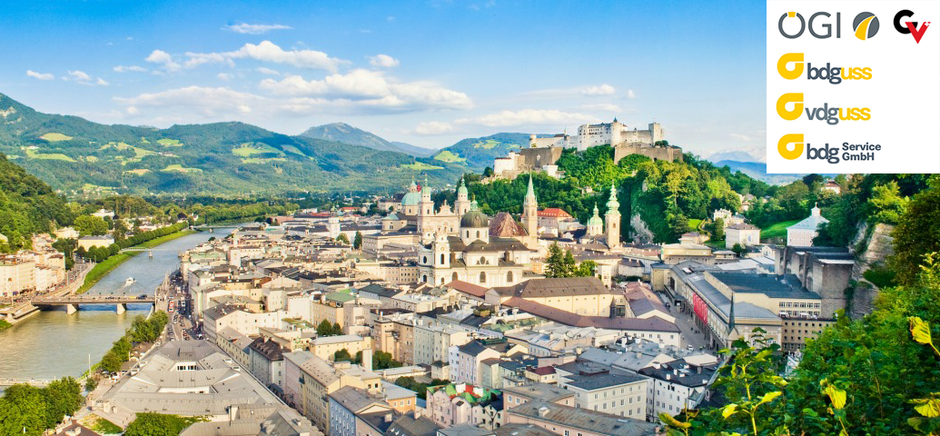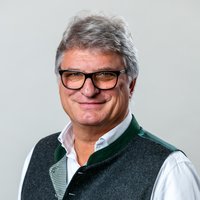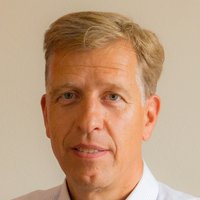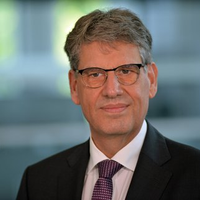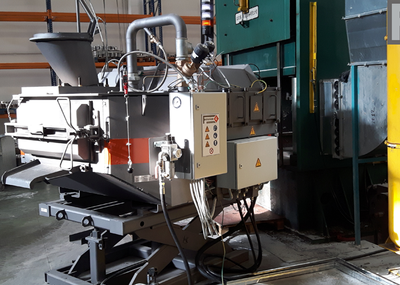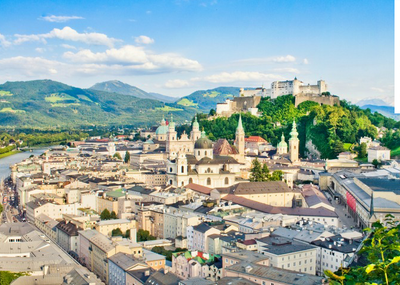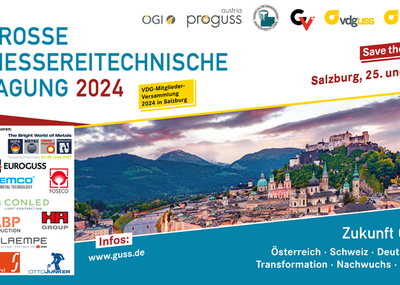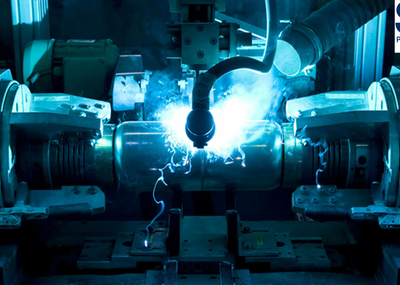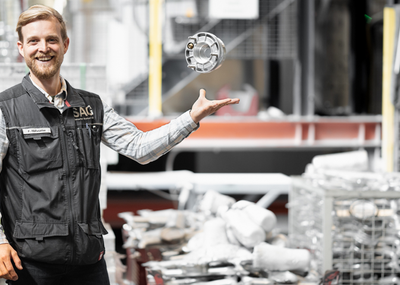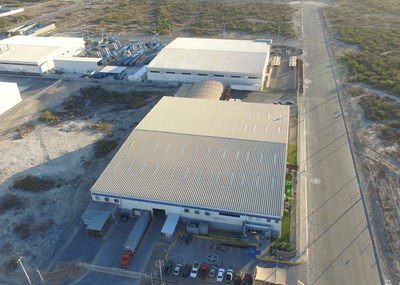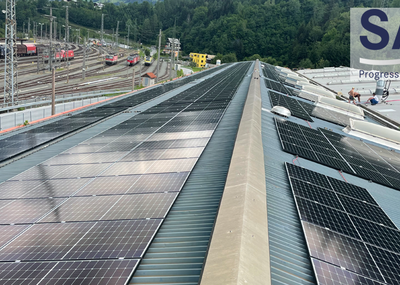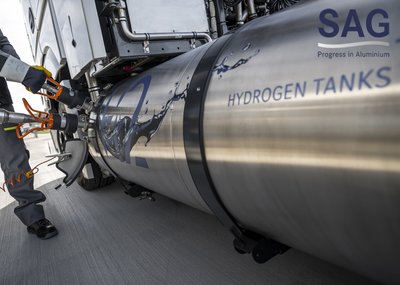« Große Gießereitechnische Tagung 2024 » on 25 and 26 April 2024 in Salzburg in the spirit of change
The German-speaking foundry world faces major challenges in 2024. While some segments are experiencing a remarkable upswing, others are facing increasing pressure from new competitors and products, changing supply chain structures and new business potential. Against this backdrop, strategic priorities need to be adjusted.
On behalf of the Austrian, Swiss and German foundry associations, Salzburg will once again become the center of the German-speaking foundry world on 25 and 26 April 2024.
The "Große Gießereitechnische Tagung 2024" will be an important forum for the exchange of information and experience for foundrymen, casting users and the supply industry.
In the lead up to the event, we want to take a look at the different regions and have interviewed those responsible at the associations:
DI Christa Zengerer
Managing Director OGI, Austrian Foundry Institute
Marcel Menet
Managing Director Foundry Association of Switzerland GVS
Max Schumacher
Managing Director BDG, Federal Association of the German Foundry Industry
1) How do you evaluate the current situation in the foundry industry in your country?
Christa Zengerer
The current situation in the foundry industry in Austria is characterized by various challenges. Due to global economic uncertainties and increasing regulations, companies are facing challenges such as rising costs for energy and raw materials, as well as increased competitive pressure from abroad. Nevertheless, there are also positive aspects, such as the efforts of many companies to introduce innovative technologies and optimize production processes.
Marcel Menet
As many Swiss foundries are heavily export-oriented, the outlook depends largely on the economic development of our key target markets such as Germany and France. The persistently strong upward pressure on the Swiss franc is causing price rises in exports that cannot be compensated for in the short term and are therefore weighing heavily on the export business. We anticipate a further slowdown in the coming months. According to some major customers, a recovery is not expected until the second half of the year and demand will pick up again, in some cases stabilizing at a low level.
Max Schumacher
Production fell by 1.6% overall in 2023 - a very weak end to the year. And the economy is not gaining momentum in the first few months of 2024 either. The foundry industry is currently in rough waters. Whether and to what extent it will be able to pick up in the second half of the year is difficult to predict due to the geo-economic and federal political conditions. The discussions I have had with foundries so far also show that their annual planning is fraught with massive uncertainties. Politicians are increasingly and urgently being called upon to provide planning certainty.
It is generally expected that interest rates will be gradually lowered in the second half of the year. This would have an impact on the willingness to invest in general and, of course, on the construction industry in particular. Foundries could also benefit from possible effects on customer industries, meaning that the 5% for the foundry industry could still be exceeded by the end of the year.
Christa Zengerer – "We need to reduce bureaucratic hurdles and high taxes and I call for better coordination between companies, government and educational institutions on an ad hoc basis"
Max Schumacher – "We need planning security, Germany's energy-intensive SMEs are committed to the location and to ecological, economic and social sustainability. With our products and innovations, we are driving the transformation and enabling climate protection and decarbonization."
2) Companies in the entire foundry sector are currently struggling with various uncertainties. Which obstacles and uncertainties could be improved immediately by creating good location conditions at national and European level? What are your ad hoc demands?
Christa Zengerer
In order to improve the conditions for the foundry industry both nationally and Europe-wide, it is crucial to remove obstacles such as bureaucratic obstacles and high taxes. A good infrastructure, access to a skilled workforce and a supportive research and innovation landscape are also important. Ad hoc, I call for better coordination between companies, the state and educational institutions in order to improve the training and qualification of skilled workers and drive innovation.
Marcel Menet
Swiss foundries are currently concerned about the sustainable pricing in of energy taxes - in addition to the general rise in prices. This requires finesse in discussions with customers.
Added to this are the effects of the interventionist policies of the major economic blocs USA, China, and EU. Europe is forced to compete with the USA and China in terms of subsidies, otherwise companies will move away due to the disadvantages of the location. A small country like Switzerland has only limited opportunities to participate in this subsidy competition.
In addition, the European intervention policy in particular, under the guise of the "European Green Deal", also distorts the markets and thus the price structures. It would be desirable for Switzerland to react to these distortions, be it through subsidy programmes for energy-intensive industries or, for example, an industrial electricity price.
Max Schumacher
Companies in the foundry industry - like companies in other industrial sectors - need planning security. Quick and decisive political action is required to restore the competitiveness of German industry. Germany's looming decline as an industrial centre has serious consequences for general prosperity, the supply of important products, the transformation to climate neutrality and the future viability of society. To be clear: German industry is behind the transformation to climate neutrality in the face of climate change. It wants to decarbonise its production processes as quickly as possible and sees itself as an active enabler of the transformation. However, this is a task of the century that can only be accomplished with a powerful and internationally successful German and European industry. Germany's energy-intensive industrial SMEs are expressly committed to Germany as a business location, to ecological, economic, and social sustainability and thus to comprehensive corporate responsibility. With our products and innovations, we are supporting the transformation and enabling climate protection and decarbonisation.
However, the question for us is: Is industrial production - explicitly including energy-intensive industrial SMEs - still wanted in Germany? Society and the administration need to rethink: allowing, not preventing, value-adding industrial production as the basis for jobs and prosperity in all parts of Germany is the order of the day. Our demand to politicians is therefore specifically aimed at setting a fundamental political course that relieves the burden on companies. And the instruments that have been created so far for the transformation must be scrutinised to see whether they really help to promote climate protection or whether they merely mean more effort and cost.
We have therefore founded the Alliance for a Fair Energy Transition (BfE) together with other associations and have summarised our demands for German industry in a manifesto. It can be downloaded at A manifesto for small and medium-sized industry! (faire-energiewende.de). Political decision-makers at federal, state, and municipal level are called upon to make a clear commitment to Germany as an industrial location.
3) The German-speaking countries play a leading role in the foundry industry in Europe and the world. What trends with positive development opportunities do you currently see and what will become established?
Christa Zengerer
There are some positive development opportunities in the German-speaking foundry industry. These include, for example, the increased use of digital technologies such as 3D printing and the simulation of cast components and processes in order to increase production efficiency. Environmentally friendly production methods and materials could also become more important. These trends are likely to become more prevalent as they offer both economic and ecological benefits.
Marcel Menet
Decarbonisation is a major challenge for the entire industry and society in general. It is therefore not surprising that a great deal of innovation is taking place in the area of sustainability. For example, some foundries want to replace natural gas and oil with CO2-neutral energy sources. There are concrete projects to replace them with electricity, while the use of hydrogen is still more in the idea phase. In general, the trends in climate protection and individual mobility towards lightweight construction are fuelling the growing demand for sustainable and innovative casting solutions.
Max Schumacher
The high standard of education and interdisciplinary expertise in research are a very clear and major advantage for the German-speaking countries, resulting in their leading position in the development of key technologies. In combination with an excellently positioned SME sector, they secure their technological sovereignty in international competition.
Green production, the circular economy and sustainability are increasingly becoming the boundary conditions of the global economy. This is likely to lead to the permissible limits for the CO2 footprint or similar being tightened further. In German-speaking countries in particular, intensive work is therefore already underway on technological solutions. An even stronger interlinking of innovative areas such as AI, material science and industrial engineering is clearly recognisable.
Pooling this expertise makes it possible to develop new materials and processes with intelligent design and combine them in such a way that the boundaries of lightweight construction can continue to be pushed - while at the same time taking sustainable production processes into account. Automotive and energy are strong drivers here. We are technology leaders and I still see a lot of development potential here. And the foundry industry in German-speaking countries will play a key role.
4) How can locations be retained while at the same time making them fit for transformation and digitalisation and countering the shortage of skilled workers? Will good training and experience be enough, or will the offerings become even more interchangeable in the future?
Christa Zengerer
A comprehensive strategy is crucial to maintaining locations and preparing them for the challenges of transformation and digitalisation. In addition to sharpening the skills and experience of employees, increased investment in research and development is essential. The importance of innovation lies in helping companies to remain competitive and enter new markets. It is also important to offer attractive working conditions and development opportunities in order to retain skilled workers in the long term and encourage their commitment. In addition, flexible working models and the use of digital platforms to network skilled workers can help to alleviate the shortage of skilled labour. Overall, a combination of investment in R&D, employee development and the creation of a flexible working environment is crucial to successfully meeting the challenges of the future and ensuring long-term competitiveness.
Marcel Menet
IT security, digitalisation and automation are being driven forward in Swiss foundries thanks to intensive employee training. The ongoing shortage of skilled and unskilled labour remains a Herculean task this year. Massive management and employee training programmes are required, as specialist and management expertise is needed both in breadth and depth to ensure that complex components can be manufactured stably using highly automated processes.
Max Schumacher
We could organise a separate specialist conference on the subject of skilled workers, so I will just make a few comments here: What is certain is that interchangeability is precisely what we can and must set ourselves apart from. We are technology leaders and must work hard to remain so in the future. I have just explained this. As an association, we are active in all the areas mentioned above in order to provide support to the industry.
Some examples: With the ReGain project we are trying to integrate AI into many areas of the casting process. The industry must distinguish itself as an attractive employer in order to stay ahead in the competition for employees. Since casting is an essential part of the transformation, we can, for example, safely meet the young generation's desire to not just do a job with work, but to make meaningful, sustainable contributions. This ensures that we have motivated employees who set us apart from the crowd and are not replaceable.
Marcel Menet – "The most important industry meeting of the D-A-CH foundry industry should be a sign of new beginnings"
5) What impulses do you expect from the large foundry technology conference in Salzburg? Do you have a personal wish?
Christa Zengerer
I hope that the large foundry technology conference in Salzburg will enable a lively exchange between all players in the foundry industry. In addition to my expectations of a lively exchange of knowledge and experiences, I also hope for a pleasant and sociable event where participants can network and chat in a relaxed atmosphere.
Marcel Menet
It meets a great need in the industry to be able to exchange ideas, especially in difficult times. The most important industry meeting for the D-A-CH foundry industries should be a sign of new beginnings!
Max Schumacher
First of all, I'm looking forward to bringing the foundries from German-speaking countries together in the great Salzburg atmosphere so that they can exchange ideas freely. The program is also promising. It spans a wide range from interesting contributions on foundry technology to important impulses on sustainability issues and the circular economy to panel discussions. I am personally particularly looking forward to the exciting keynotes at the beginning and end of the conference. That should not be missed. The exhibition is also well booked and will give rise to many specialist discussions. Did I already mention that the foundry evening will once again be a highlight? I think so, but that can't be mentioned often enough
What am I looking forward to? On showing a traditional industry in stormy times its opportunities, relevance, and potential, and on uncompromisingly demanding a commitment to local casting.
My personal wish is that when I leave, I can take with me the participants' strong recommendation to repeat this meeting as soon as possible. I am in!
Glück Auf!
Designed by: Maximilian Schröck – Foundry-Planet GmbH

